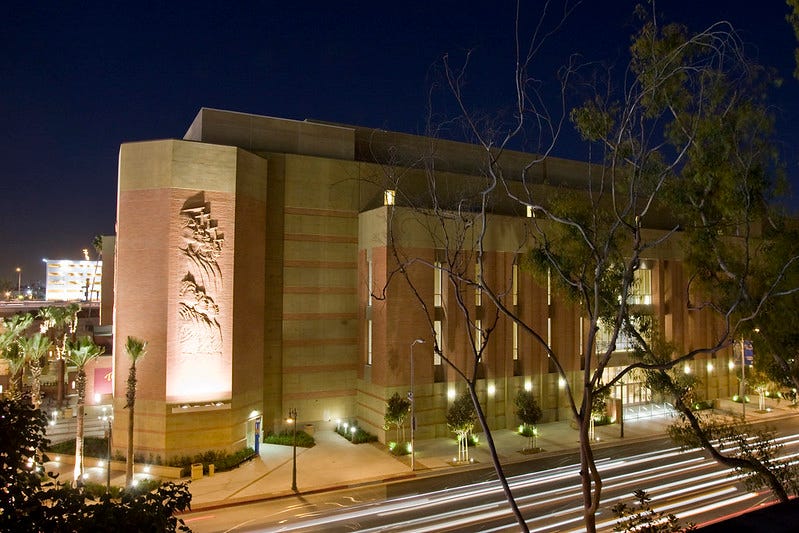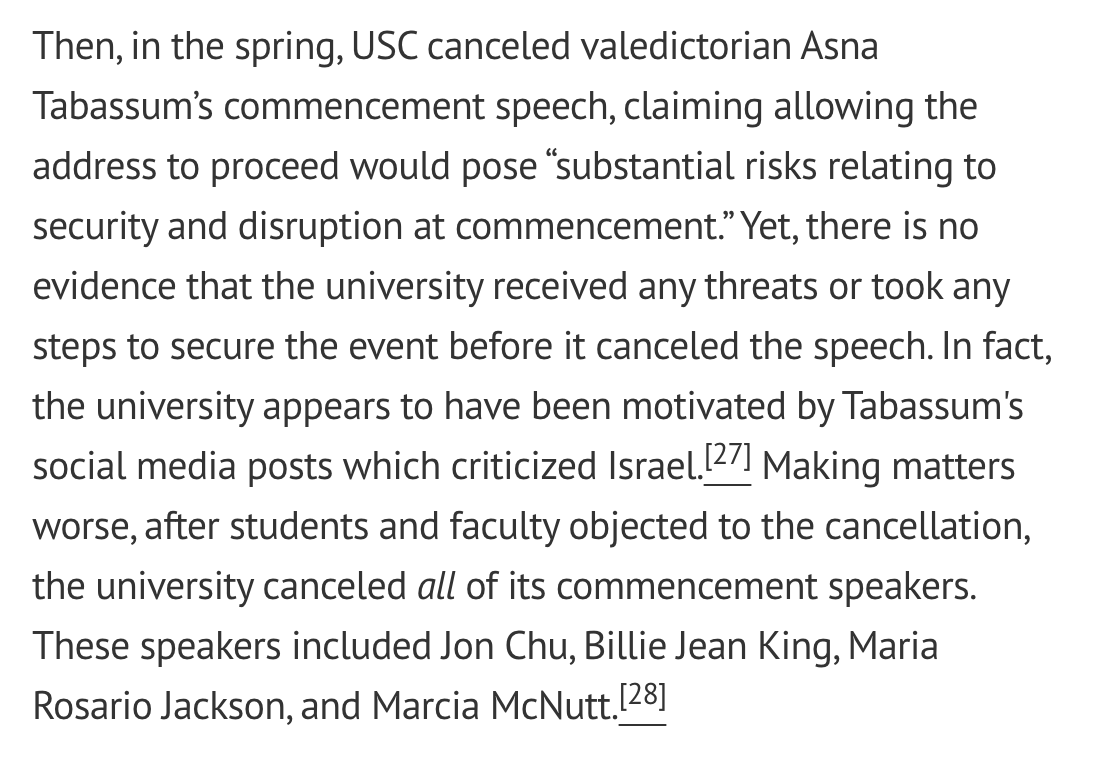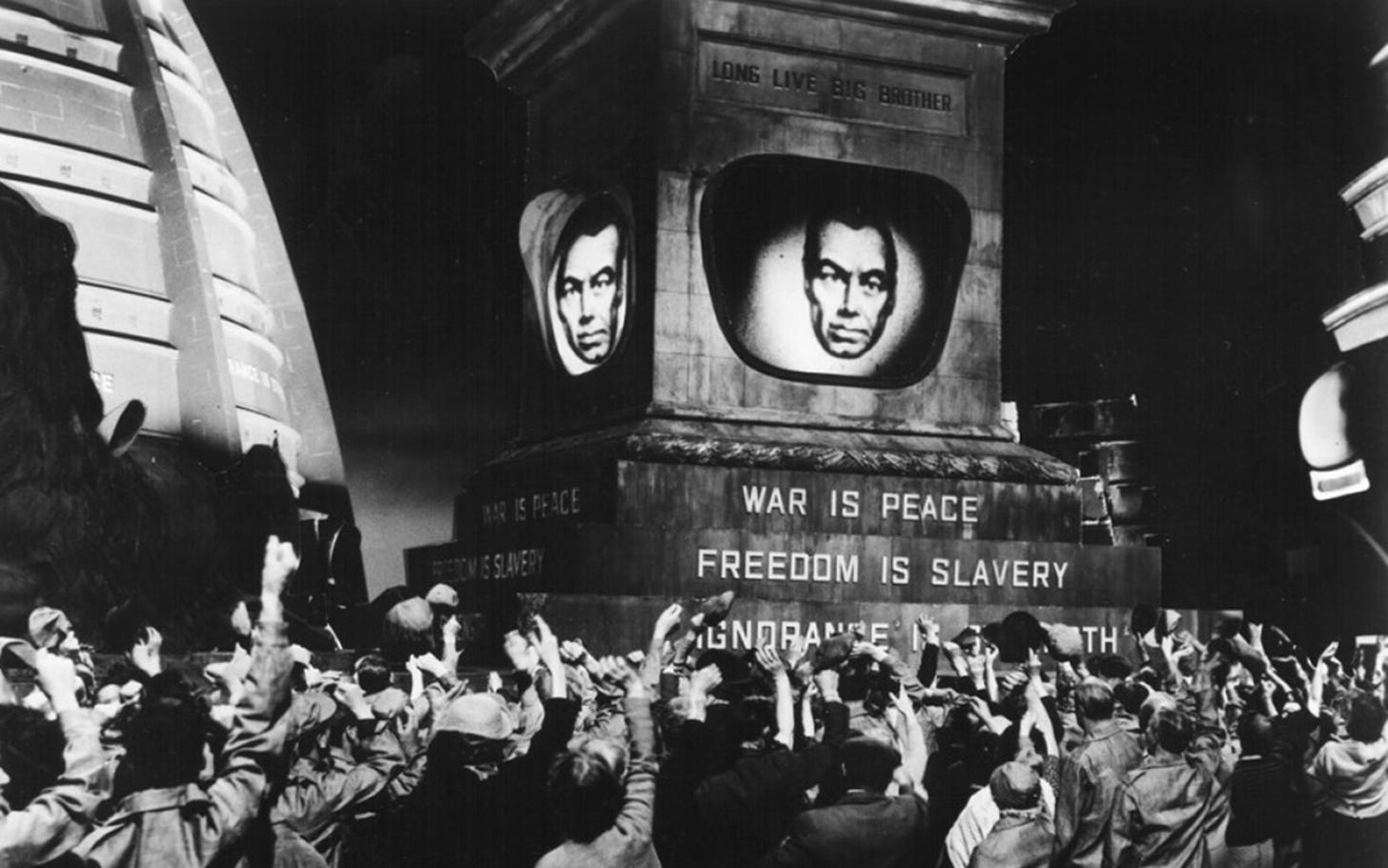Heterodox at USC Newsletter #13
USC's FIRE rankings drop dramatically, punishment of Pro-Palestine protestors enters Orwellian territory, and a reminder about our upcoming event.
Our first newsletter of the new academic year started off with some good news regarding institutional neutrality at USC. Unfortunately, this edition brings less positive news.
The Foundation for Individual Rights and Free Expression recently published its 2025 College Free Speech Rankings, revealing that USC has fallen by over 100 spots. We are currently at 245 out of 251, placing us in the bottom ten for the entire nation and narrowly escaping the bottom five. Last year we were at 109.
Much of our drop, according to FIRE, has to do with the bungling of the 2024 valedictorian speech, which we’ve already covered in a previous newsletter.
Overall, this incident is in line with other campus events in which a culture of “safetyism” seems to take precedent over the airing and clashing of disparate, unpopular, or even offensive ideas. As Morris Levy, associate professor of political science and international relations, stated in The Daily Trojan back in April:
[The university] has shrunk from its responsibility to ensure broad latitude for the expression of controversial ideas, emboldened would-be censors and chilled campus debate. The administration should reverse course. It should reinstate the valedictory address and deal aggressively with any threats to security.
Members of the University community who find the anti-Israel content on Tabassum’s social media appallingly ignorant or worse — as I do — should be able to rebut it with confidence that USC will stand behind our right to free expression, as well.
According to FIRE, the pro-Palestine encampment on campus during the spring semester also seems to have worsened free expression on campus, especially in regards to posting online:
Higher percentages of USC students reported discomfort expressing controversial views publicly on campus during the encampments. Prior to the encampments, 53% said they feel “very” or “somewhat” uncomfortable expressing controversial political views on a social media account tied to their name. After the start of the encampments, 67% said the same.
Was this because students felt that expressing controversial opinions online would attract punishment by the university, thanks to their handling of the valedictorian situation? Because they feared surveillance and harassment by the outspoken activists managing the encampment? In either case, this chilling of free expression didn’t help our ranking.
If you have suggestions for things you’d like us to cover, feedback on our newsletter, or want to get more involved with Heterodox at USC please contact us at heterodox.usc@gmail.com. We’d also love if you forwarded this email to Heterodox-minded colleagues and alumni.
Compelling Speech
The university’s apparent punishment plan for students who violated rules during the embattled encampment will likely not do much to raise our FIRE ranking in the future.
According to a recent article in the LA Times, the administration seems to be forcing students, such as third-year law student Sarah Howell-Egan whom the reporter interviewed, to write contrite essays about their behavior:
As part of the process, the university’s Office of Community Expectations has directed her to craft a four-page reflection essay about her behavior.
Other students have received similar assignments, due in late September, to write “personal thoughts, experiences, and insights” from the protest and “how you might make different decisions in the future.” The papers “may not serve to justify your own actions or evaluate the actions of others,” and must be “double-spaced, 12-point Times New Roman font with one-inch margins,” according to a copy of the instructions shared with The Times.
This is essentially compelled speech. Far from the intended effect of making students reconsider their actions, it will only make them double down on already entrenched, passionate viewpoints:
“USC’s really leaning into the idea that the process is the punishment,” said Howell-Egan, also charged with being a leader in USC’s protests, although she described her role as a public liaison to police. “I don’t know if their intention is to make me regret our activism, but what it really does is strengthen my beliefs.”
Howell-Egan says she was suspended for her behavior and is banned from campus and classes until at least the spring, still awaiting an official hearing date. That seems punishment enough for her decisions, without adding on the equivalent of writing “I will not camp out on campus” 25 times on the chalkboard like a wayward teen.
The fact that she still hasn’t had a hearing almost four months after the debacle, seems quite troublesome. Students should be treated like adults, and the process should also be swift. Those who violate university rules (which they agree to upon enrolling) must be promptly warned, suspended, expelled or provided some other conventional form of punishment, not subjected to drawn-out, opaque “disciplinary processes” and coercive reflection exercises.
Thomas Seifrid, professor of Slavic languages and literatures, finds alarming historical parallels for this entire situation:
For someone in my field what is especially chilling about this is that it closely resembles a technique of mind-control and behavioral-control used by the Soviet government, when writers put on show trial were forced to make statements in which they abjectly apologized for their ideological errors, and even pupils in elementary school could be summoned before the class for public shaming in a ritual that was called, evidently without an awareness of the irony, a “heart to heart talk” (in Russian, разговор по душам).
In the nineteenth century an intellectual named Petr Chaadaev published a “philosophical letter” in which he argued that Russia had no cultural achievements to its name and could only move forward by joining the west and converting to Catholicism. His ideas grossly offended the autocratic Tsar Nicholas I, and Chaadaev was declared insane and forced to write a recantation. He called it, in French, Apologie d’un fou – “Apology of a Madman.” I do no know if it had to be double-spaced and in 12-point font.
Reminder: Our first event is just over a month away!
Tuesday, October 15 | 6pm to 7:15pm | Dean’s Conference Room, Ralph and Goldy Lewis Hall (RGL) 308
Drawing from themes of his new book, We Have Never Been Woke: The Cultural Contradictions of a New Elite, Stony Brook University sociologist Dr. Musa al-Gharbi explores how most scholars and journalists on the "blue" line of political charts lead us to focus inordinately on the "red" line, and often to discuss the people on the "red" line in prejudicial ways — frequently in defiance of our own empirical evidence. USC Price Professor Dr. Michael Thom will give opening remarks. This talk is for USC students, staff, and faculty only.
The room will fit 25 to 30 and we’d love to have a good turnout, so please mark your calendars and forward this invite to any (USC) people you think would be interested.




